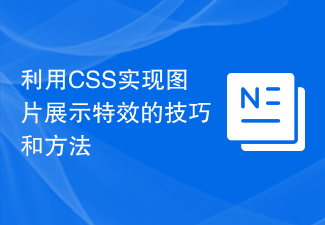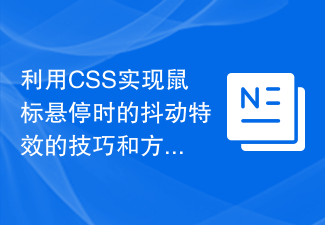 Web Front-end
Web Front-end CSS Tutorial
CSS Tutorial An overview of the new features of CSS3: How to apply CSS3 animation effects
An overview of the new features of CSS3: How to apply CSS3 animation effects
Overview of the new features of CSS3: How to apply CSS3 animation effects
Introduction:
With the development of the Internet, CSS3 has gradually replaced CSS2 as the most popular front-end development tool. Commonly used style languages. CSS3 provides many new features, the most popular of which is animation effects. By using CSS3 animation, you can add stunning interactive effects to web pages and improve user experience. This article will introduce some commonly used animation features of CSS3 and provide relevant code examples.
1. Transition Animation
Transition animation is the simplest and most commonly used animation effect in CSS3. By setting the transition attribute of an element, you can achieve a smooth transition of the element from one state to another within a certain period of time, such as changes in color, size, or position.
Here is an example that demonstrates the color of a button transitioning to another color when the mouse is hovered:
<button class="transition-btn">按钮</button>
.transition-btn {
color: white;
background-color: blue;
padding: 10px;
border: none;
transition: background-color 0.5s;
}
.transition-btn:hover {
background-color: red;
}In the above example, when the mouse is hovered over the button, the background The color will smoothly transition from blue to red with a transition time of 0.5 seconds.
2. Keyframe Animation
Keyframe animation is a relatively advanced animation effect in CSS3. In keyframe animation, you can define the attribute values of elements at different points in time. This allows for more complex animation effects. Keyframe animation usually contains @keyframes rules and animation attributes.
The following is an example that demonstrates the animation effect of a picture moving from left to right:
<img class="keyframe-img lazy" src="/static/imghwm/default1.png" data-src="image.jpg" alt="An overview of the new features of CSS3: How to apply CSS3 animation effects" >
.keyframe-img {
position: relative;
animation: slide 3s linear infinite;
}
@keyframes slide {
0% { left: 0; }
100% { left: 200px; }
}In this example, the picture will move smoothly from the left to the right, and finally reach the end. After going to the right, return to the far left. The total time of the animation is 3 seconds, using a linear change speed and playing in an infinite loop.
3. Transform Animation
Transform animation uses the transformation attribute (transform) of CSS3 to achieve the deformation effect of elements, such as rotation, scaling, movement, etc. By setting different deformation properties and values, you can create a variety of unique animation effects.
The following is an example that demonstrates the effect of a block rotation:
<div class="transform-box"></div>
.transform-box {
width: 100px;
height: 100px;
background-color: green;
transform-origin: center center; /* 变形基点为中心 */
animation: rotate 5s linear infinite;
}
@keyframes rotate {
0% { transform: rotate(0deg); }
100% { transform: rotate(360deg); }
}In the above example, the block will rotate around its center point at a rate of one revolution per second. The total time of the animation is 5 seconds, using a linear change speed and playing in an infinite loop.
Summary:
The animation features of CSS3 provide a rich variety of animation effects. By using transition animation, keyframe animation and transformation animation, front-end developers can add vivid and attractive interactive effects to web pages. The above examples are just the tip of the iceberg of CSS3 animations. I hope that the introduction in this article can provide readers with some inspiration to create more cool animation effects. Let us create unlimited imagination and creativity in the online world together!
The above is the detailed content of An overview of the new features of CSS3: How to apply CSS3 animation effects. For more information, please follow other related articles on the PHP Chinese website!
 CSS动画指南:手把手教你制作闪电特效Oct 20, 2023 pm 03:55 PM
CSS动画指南:手把手教你制作闪电特效Oct 20, 2023 pm 03:55 PMCSS动画指南:手把手教你制作闪电特效引言:CSS动画是现代网页设计中不可或缺的一部分。它可以为网页带来生动的效果和交互性,并提升用户体验。在本指南中,我们将详细介绍如何使用CSS来制作闪电特效,以及提供具体的代码示例。一、创建HTML结构:首先,我们需要创建一个HTML结构来容纳我们的闪电特效。我们可以使用一个<div>元素来包裹闪电特效,并为
 CSS动画教程:手把手教你实现翻页特效Oct 24, 2023 am 09:30 AM
CSS动画教程:手把手教你实现翻页特效Oct 24, 2023 am 09:30 AMCSS动画教程:手把手教你实现翻页特效,需要具体代码示例CSS动画是现代网站设计中必不可少的一部分。它可以为网页增添生动感,吸引用户的注意力,并且提高用户体验。其中一种常见的CSS动画效果就是翻页特效。在这篇教程中,我将带领大家一步一步实现这个引人注目的效果,并提供具体的代码示例。首先,我们需要创建一个基本的HTML结构。代码如下:<!DOCTYPE
 CSS动画指南:手把手教你制作眨眼特效Oct 20, 2023 pm 03:24 PM
CSS动画指南:手把手教你制作眨眼特效Oct 20, 2023 pm 03:24 PMCSS动画指南:手把手教你制作眨眼特效眨眼特效是一种常见的CSS动画效果,通过简单的代码实现,可以带来生动独特的效果。本文将为你提供一份手把手的指南,教你如何使用CSS制作眨眼特效,并提供具体的代码示例。创建HTML结构首先,我们需要创建一个HTML结构,用于展示眨眼特效。代码如下:<!DOCTYPEhtml><html>&
 利用CSS实现图片展示特效的技巧和方法Oct 24, 2023 pm 12:52 PM
利用CSS实现图片展示特效的技巧和方法Oct 24, 2023 pm 12:52 PM利用CSS实现图片展示特效的技巧和方法无论是网页设计还是应用开发,图片展示都是非常常见的需求。为了提升用户体验,我们可以利用CSS来实现一些炫酷的图片展示特效。本文将介绍几种常用的技巧和方法,并提供相应的代码示例,帮助读者快速上手。一、图片缩放特效缩放鼠标悬浮效果当鼠标悬浮在图片上时,通过缩放效果可以增加交互性。代码示例如下:.image-zoom{
 CSS动画教程:手把手教你实现脉冲特效Oct 21, 2023 pm 12:09 PM
CSS动画教程:手把手教你实现脉冲特效Oct 21, 2023 pm 12:09 PMCSS动画教程:手把手教你实现脉冲特效,需要具体代码示例引言:CSS动画是网页设计中常用的一种效果,它可以为网页增添活力和视觉吸引力。本篇文章将带您深入了解如何利用CSS实现脉冲特效,并提供具体的代码示例教您一步步完成。一、了解脉冲特效脉冲特效是一种循环变化的动画效果,通常用在按钮、图标或其他元素上,使其呈现出一种跳动、闪烁的效果。通过CSS的动画属性和关键
 利用CSS实现鼠标悬停时的抖动特效的技巧和方法Oct 21, 2023 am 08:37 AM
利用CSS实现鼠标悬停时的抖动特效的技巧和方法Oct 21, 2023 am 08:37 AM利用CSS实现鼠标悬停时的抖动特效的技巧和方法鼠标悬停时的抖动特效可以为网页添加一些动感和趣味性,吸引用户的注意力。在这篇文章中,我们将介绍一些利用CSS实现鼠标悬停抖动特效的技巧和方法,并提供具体的代码示例。抖动的原理在CSS中,我们可以使用关键帧动画(keyframes)和transform属性来实现抖动效果。关键帧动画允许我们定义一个动画序列,通过在不
 CSS实现淡入淡出图片效果的技巧和方法Oct 20, 2023 pm 04:25 PM
CSS实现淡入淡出图片效果的技巧和方法Oct 20, 2023 pm 04:25 PMCSS实现淡入淡出图片效果的技巧和方法在网页设计中,图片的展示是非常重要的一部分。为了提升用户体验,我们经常会使用一些动态效果来增加页面的吸引力。其中,淡入淡出效果是一种常见且优雅的动画效果,可以让页面显得流畅和有活力。本文将介绍使用CSS实现淡入淡出图片效果的技巧和方法,并提供具体的代码示例供参考。一、使用CSS的opacity属性实现淡入淡出效果CSS的
 CSS动画教程:手把手教你实现淡入淡出效果Oct 18, 2023 am 09:22 AM
CSS动画教程:手把手教你实现淡入淡出效果Oct 18, 2023 am 09:22 AMCSS动画教程:手把手教你实现淡入淡出效果,包含具体代码示例在网页设计和开发中,动画效果可以让页面更加生动和吸引人。而CSS动画是一种简单而且强大的方式来实现这种效果。本篇文章将手把手教你如何使用CSS来实现淡入淡出效果,并提供具体的代码示例供参考。一、淡入效果淡入效果是指元素从透明度为0逐渐变为透明度为1的效果。以下是实现淡入效果的步骤和代码示例:步骤1:


Hot AI Tools

Undresser.AI Undress
AI-powered app for creating realistic nude photos

AI Clothes Remover
Online AI tool for removing clothes from photos.

Undress AI Tool
Undress images for free

Clothoff.io
AI clothes remover

AI Hentai Generator
Generate AI Hentai for free.

Hot Article

Hot Tools

VSCode Windows 64-bit Download
A free and powerful IDE editor launched by Microsoft

PhpStorm Mac version
The latest (2018.2.1) professional PHP integrated development tool

DVWA
Damn Vulnerable Web App (DVWA) is a PHP/MySQL web application that is very vulnerable. Its main goals are to be an aid for security professionals to test their skills and tools in a legal environment, to help web developers better understand the process of securing web applications, and to help teachers/students teach/learn in a classroom environment Web application security. The goal of DVWA is to practice some of the most common web vulnerabilities through a simple and straightforward interface, with varying degrees of difficulty. Please note that this software

Zend Studio 13.0.1
Powerful PHP integrated development environment

EditPlus Chinese cracked version
Small size, syntax highlighting, does not support code prompt function





